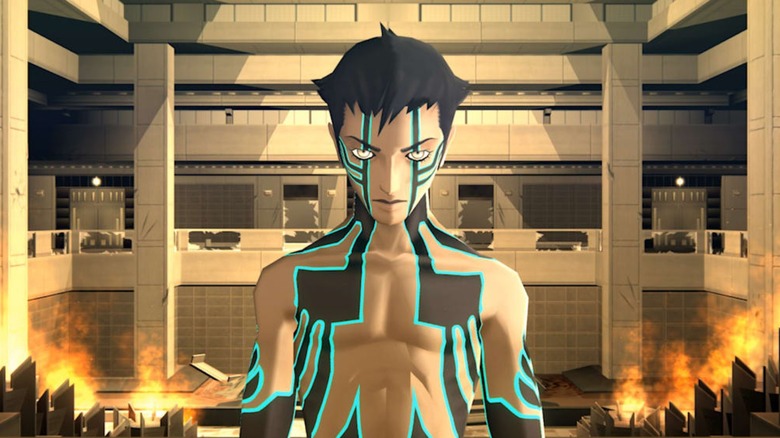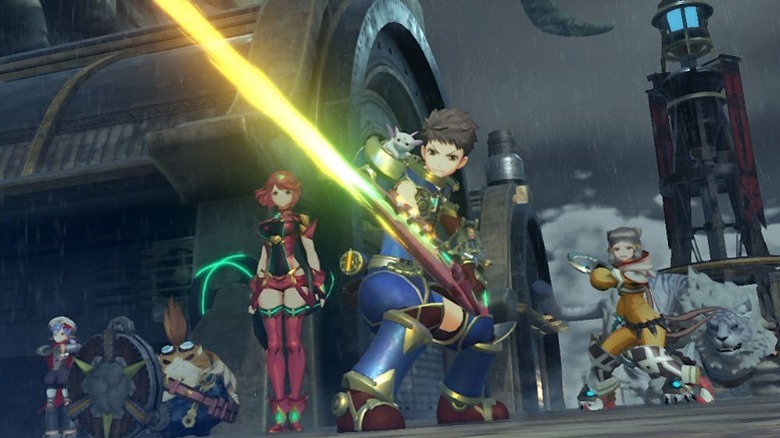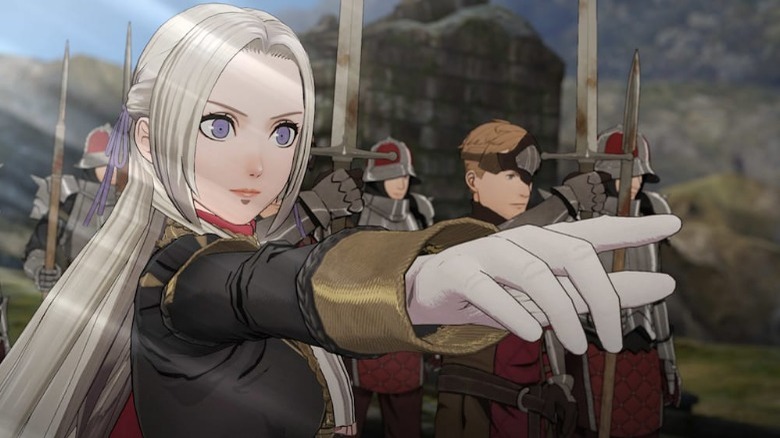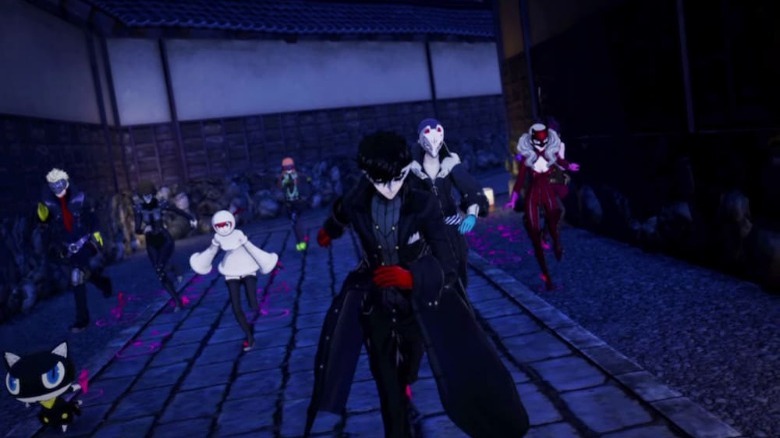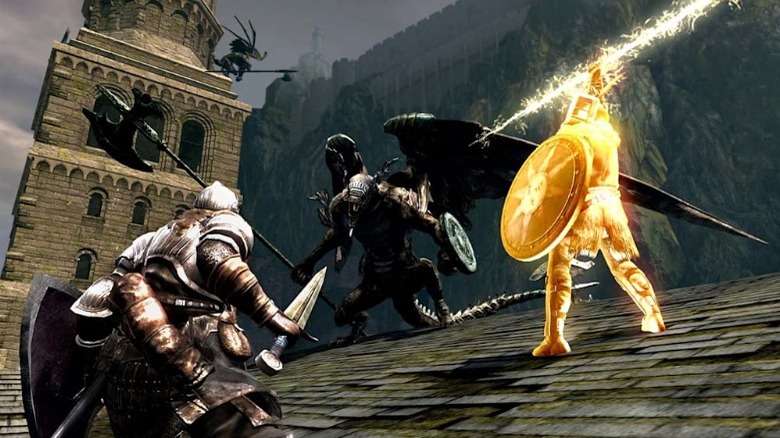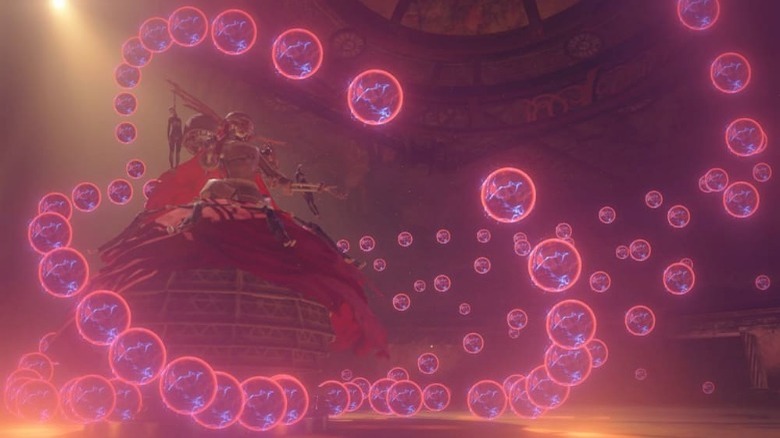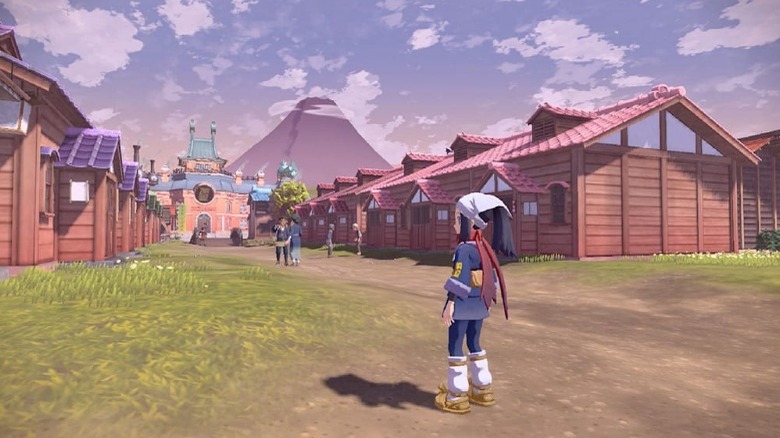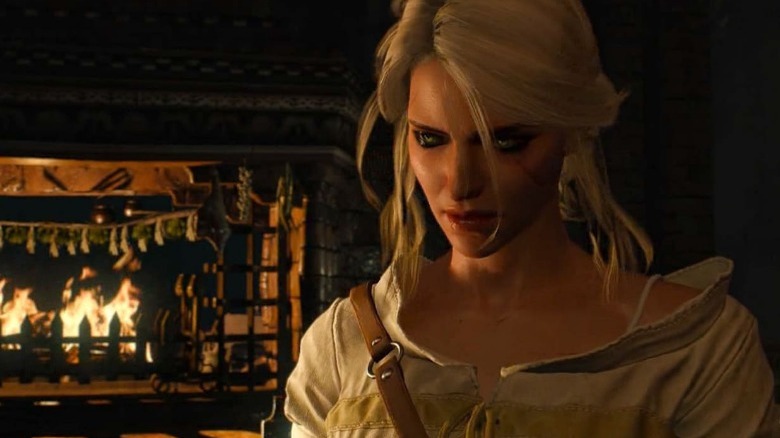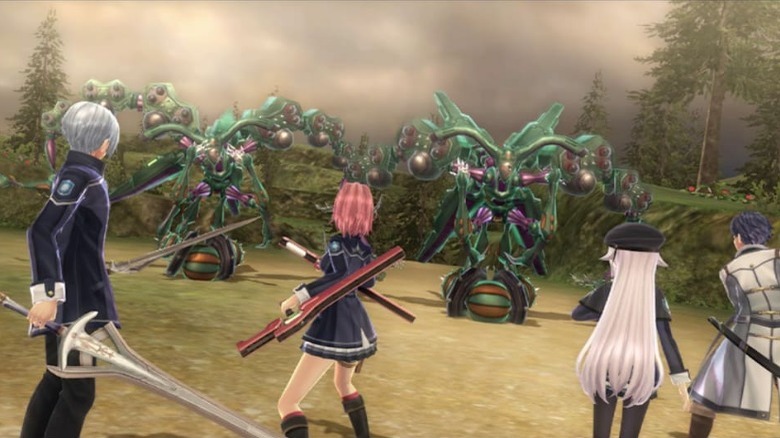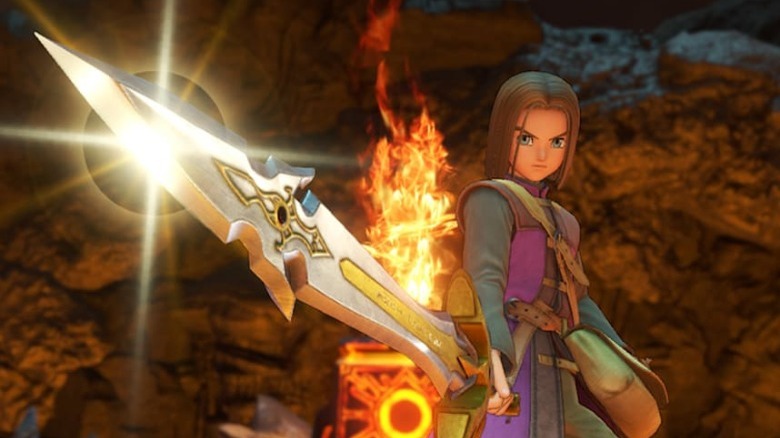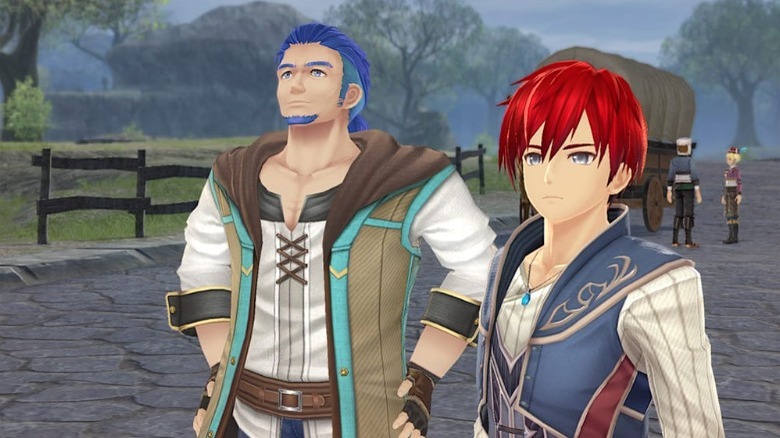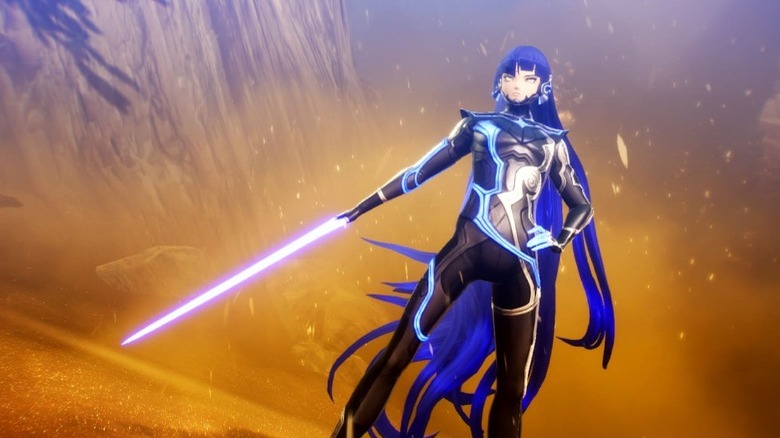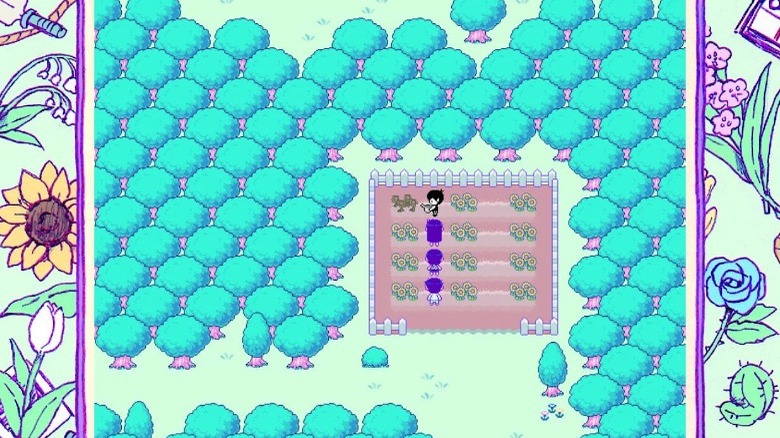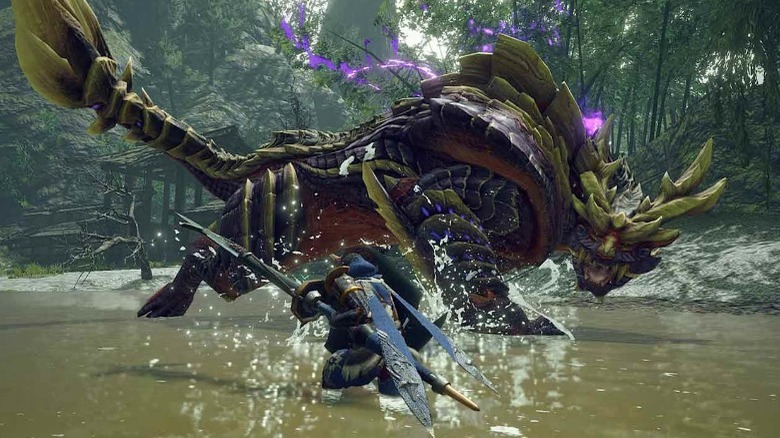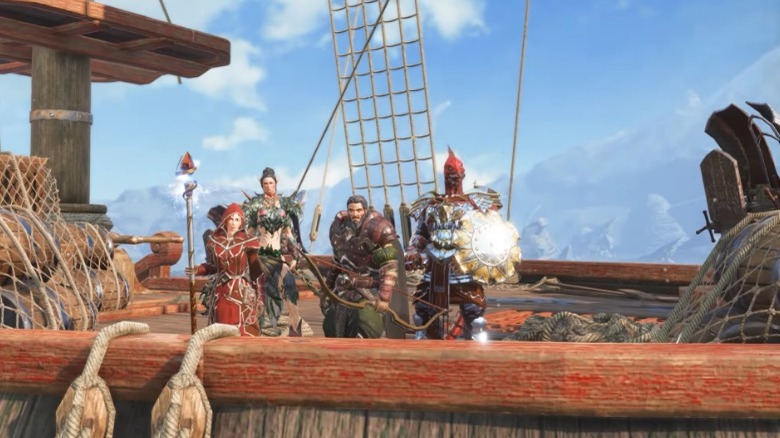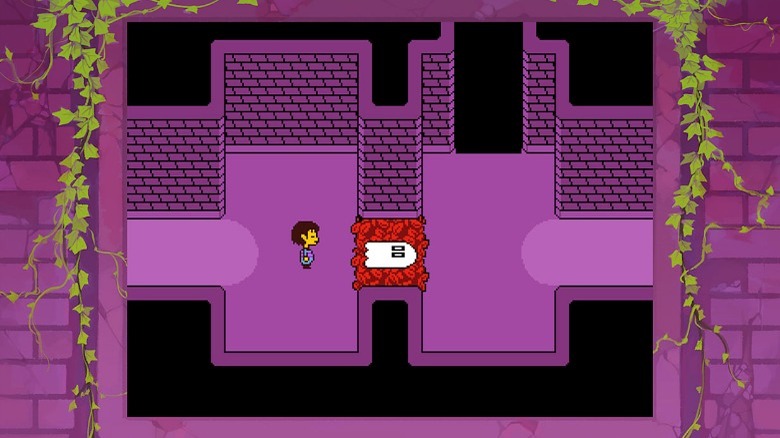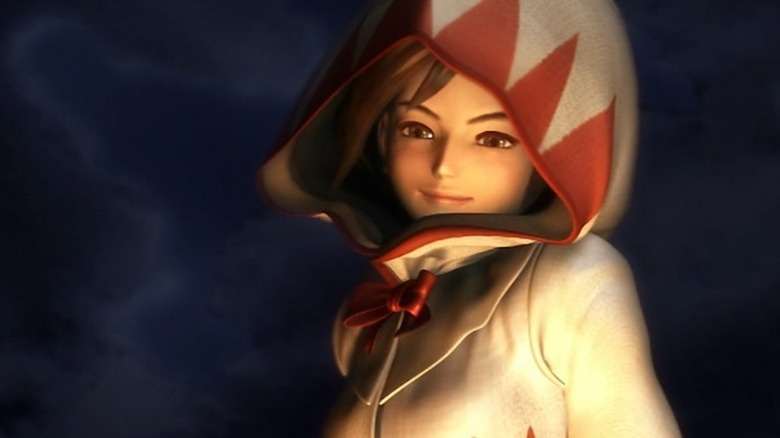The 16 Best Nintendo Switch RPGs
If you want the most bang for your buck, you can't go wrong with an RPG. Games in this genre are generally some of the longest in the video game industry, lasting tens if not hundreds of hours. Once you start an RPG, expect to sink the better part of a year into it, but this length can be a double-edged sword. Unless you play the game on the go, that is.
RPGs are available on virtually every console on the market, including the Nintendo Switch. While other platforms provide better graphics, the Switch has a leg up on the competition due to its handheld nature. The PlayStation 5 and Xbox Series X are monolithic graphical powerhouses, but they aren't exactly playable on airplanes. Same goes for gaming PCs — unless you buy a Steam Deck or laptop, that is. Plus, the Switch is home to several RPGs that aren't available on any other platform.
Whether you are chilling on the couch or sitting through a 15-hour flight, here are some of the best RPGs you can play on the Nintendo Switch.
The Xenoblade Chronicles Series
The Nintendo Wii wasn't known for RPGs, but it still introduced audiences to the world of "Xenoblade Chronicles." The game received a "sequel" (that was more like a spin-off) on the Wii U, but the "Xenoblade" franchise didn't truly kick off until the Nintendo Switch.
Fundamentally, each "Xenoblade" title plays the same. They are all open-world action RPGs players can explore as they see fit, at least until they encounter enemies that are too strong for their level. Every entry improves on what came before and features a unique gimmick, such as the ability to predict and prevent devastating attacks or collect randomized living weapons. Of course, "Xenoblade" games have more than just polished combat; they also levy the power of iconic characters and stories that tug at player heartstrings, all backed by some of the best RPG soundtracks this side of Nobuo Uematsu.
The "Xenoblade Chronicles" series currently consists of three games on the Nintendo Switch. The first is the second entry in the series, "Xenoblade Chronicles 2." After that game, instead of releasing a sequel, Nintendo launched a remastered version of the original "Xenoblade Chronicles," "Xenoblade Chronicles Definitive Edition," complete with new graphics and bonus post-game missions. Currently, the latest in the series is "Xenoblade Chronicles 3." Now, all we need is for Nintendo to finally port "Xenoblade Chronicles X" off the Wii U, and we can finally play the entire "Xenoblade" chronicles on the Switch.
Fire Emblem: Three Houses and Three Hopes
Before "Super Smash Bros. Melee," most Western gamers had never heard of "Fire Emblem," but the inclusion of Marth and Roy in "Melee" awakened a steadily growing fanbase. Now, "Fire Emblem" is one of Nintendo's most beloved properties, thanks in no small part to pocket-sized platforms like the Switch.
As of writing, "Fire Emblem: Three Houses" is the most recent mainline entry in the series and arguably the most popular. The game has all the tactical battlefield action audiences love, albeit with some minor changes, but the narrative is what keeps audiences hooked. "Three Houses" is split into three separate paths, each a lengthy and enthralling RPG story in its own right. This design choice alone increases replayability threefold, but add in choices that alter stories within paths, and you have the most content-heavy "Fire Emblem" game yet.
In a somewhat surprising move, Nintendo decided to team up with Omega Force (the studio behind "Dynasty Warriors") to create the spin-off "Fire Emblem Warriors: Three Hopes." Unlike Omega Force's previous "Fire Emblem Warriors" title, "Three Hopes" is a what-if story that casts the protagonist of "Three Houses" as the antagonist. The game has all the Musou action audiences expect from a "Warriors" title, complete with a "Fire Emblem" spin — but like "Three Houses," "Three Hopes" also features three story paths. And again, each path packs enough twists and turns to fill out a full-length RPG. Even if "Fire Emblem Engage" is 2023's game of the year, it will have a hard time topping "Fire Emblem: Three Houses" and "Three Hopes."
Persona 5 Royal and Strikers
When Nintendo announced Joker from "Persona 5" would be the first DLC character for "Super Smash Bros. Ultimate" (not counting Piranha Plant), audiences were equal parts excited and confused. On one hand, "Persona 5" is the personification of fantastic RPG design, so if any game deserves representation in "Smash" it's "Persona 5." But on the other hand, at the time of Joker's announcement, the Nintendo Switch didn't have any "Persona" games. That is no longer the case.
While you can't play the original "Persona 5" on the Nintendo Switch, you can play the updated "Persona 5 Royal," which sports all the characters, story beats, and turn-based combat that got players hooked. However, "Royal" was originally released on the PlayStation 4, which is more powerful than the Nintendo Switch. Still, the Switch version achieves the seemingly impossible and churns out decent performance. Sure, the port turns down some graphical options and increases load times, but that's not a bad sacrifice.
Even though "Persona 5 Royal" only recently jumped onto the Switch, that wasn't the console's first taste of "Persona." A year after Joker stole the hearts of "Smash Bros." fans, Atlus released "Persona 5 Strikers," a Musou-themed "spin-off" starring the cast of "Persona 5," except not really. Unlike "Fire Emblem Warriors: Three Hopes," "Persona 5 Strikers" isn't a "what-if" spin-off but rather a sequel. Plus unlike similar Musou games that only use their theming as a paint job, "Strikers" is a bona fide RPG that levies Musou action. The game is an evolution of the genre Omega Force is known for, and it also runs well on the Switch.
Dark Souls: Remastered
The original "Dark Souls" revolutionized the game industry, but it was far from perfect. Even though the game released on the Xbox 360 and the PlayStation 3, these consoles struggled with certain areas, especially Blighttown. When FromSoftware finally fixed these performance woes, the game was more than ready to invade Switch consoles worldwide.
The gameplay loop of "Dark Souls" is so iconic it has become part of this gamer generation's zeitgeist. The game is a brutally difficult (but still fair) journey that pits players against overwhelming odds, all while a pitch-perfect presentation drives home a dreary, almost hopeless atmosphere. Death is a foregone conclusion, and what scant victories players achieve are determined less by leveling up stats and armor and more by pure skill. However, these RPG-style improvements still help and also determine playstyles. Because of the sheer number of stats and items, players are free to tailor builds any way they see fit, and each one is as viable as the last. All of these factors combine to create a challenging experience that makes each victory feel as earned as it does unreachable.
While it's difficult to buy the original "Dark Souls," you don't need to since "Dark Souls Remastered" is an objectively superior title. The remaster looks far better than the original and sports a solid framerate. Even though the Switch port doesn't measure up to the PlayStation 4 or Xbox One versions, it is far more portable as a tradeoff. Where else can you fight Artorias the Abysswalker while on a train?
NieR Automata
Yoko Taro has become an RPG icon thanks to mind-bending titles such as "NieR," but Nintendo Switch owners could only experience Taro's signature madness if they played "Voice of Cards." As of 2022, that is no longer the case.
"NieR Automata" is arguably Taro's best title. The game is an emotional masterpiece that tells the story of androids fending off alien robots, and it throws numerous moral and even philosophical curveballs as the narrative progresses, even when players are trudging through New Game+. Thanks to the characters and soundtrack, multiple segments are bound to make audiences tear up. And of course, since "NieR Automata" was developed by PlatinumGames, the title sports the best action and combat sequences since "Bayonetta 2."
Instead of receiving the base game version, Switch owners can purchase "NieR Automata: The End of YoRHa Edition," which includes all of the title's DLC. While the game doesn't look as good as other versions thanks to the Switch's weaker hardware, it still maintains a solid framerate, which is paramount in fast-paced action titles. Honestly, the fact "NieR Automata" is even running on the Nintendo Switch is nothing short of black magic, but if game devs could port "Automata" to the Switch, then there's hope for "NieR Replicant."
Pokémon Legends: Arceus
"Pokémon Scarlet" and "Violet" are underwhelming entries. Conceptually, they hold promise with plenty of new lands to explore and Pokémon to catch. However, game performance is burdened by bugs, and we don't mean Spewpa and Scyther. Thankfully — but paradoxically — Nintendo and Game Freak released a superior "Pokémon" game on the Switch earlier the same year.
"Pokémon Legends: Arceus" changed the "Pokémon" formula in all the right ways. The game still revolves around catching 'em all, but this time players get to do so in wide, open areas. These biomes are still technically separated levels, but they have enough landmarks and square footage to feel like part of an open world. Moreover, "Pokémon Legends: Arceus" feels like a brand new adventure thanks to a complete lack of Gym battles and the implementation of a stealth mechanic that lets players catch Pokémon without battling. The game even uses an evolution of the classic battle system that lets Pokémon attack multiple times in a row depending on their speed. And to accentuate this system, "Legends: Arceus" features a new gimmick, Attack Styles, that can turn the tide of battle by letting players decide if they would rather deliver multiple weaker attacks or a single strong one.
All of the tweaked and new features in "Pokémon Legends: Arceus" weave together to create an addictive experience that encourages exploration and chucking Poké Balls at everything that moves. The game set a new standard for the franchise, one that "Pokémon Scarlet" and "Violet" unfortunately didn't live up to.
The Witcher 3: Wild Hunt
Name the greatest RPG you can think of. Odds are your mind jumped to "The Witcher 3: Wild Hunt." If so, good choice. The game deserves its sparkling reputation.
"The Witcher 3: Wild Hunt" is a landmark in open-world design and RPG storytelling. Every character is expertly written and voiced, and the world is brimming with activities, beautiful vistas, and atmosphere. While the main narrative is excellent, many claim that "The Witcher 3" saves its best writing for side missions. You can't say you've truly experienced "The Witcher 3" unless you've completed quests such as "The Last Wish" and "A Matter of Life and Death."
Even though "The Witcher 3" originally released for the Xbox One, PlayStation 4, and PC, the Switch port does a decent job of translating the game to the console's relatively weaker hardware. Textures, resolution, and framerate are all scaled back, but most audiences probably won't notice these reasonable sacrifices. Plus, even though "The Witcher 3" is the third entry in the "Witcher" franchise — the "3" in the title should have tipped you off — you don't need to play the first two entries to enjoy the game.
"The Witcher 3: Wild Hunt" is a lengthy, standalone experience, and the Switch's portability is a boon for anyone who wants to play but also travels a lot. Plus when you've finished, you can buy DLC for even more "Witcher" fun.
The Legend of Heroes Series
Quite frankly, "Final Fantasy" and "Dragon Quest" have ruined RPG naming conventions. Even though each entry features a number, as if they are interconnected sequels, they are more like standalone episodes of an anthology series. If it weren't for all the Moogles and Chocobos, you might think each "Final Fantasy" entry belongs to a different franchise. But not all RPGs follow this example.
Nihon Falcom's "The Legend of Heroes" series is an underappreciated cult classic franchise that takes place in a world where magic and technology mix. Combat is an addictive tightrope that forces players to weigh character initiative and placement, but the franchise is probably best known for its worldbuilding. "The Legend of Heroes" is split into several arcs, each one taking place in a different country within the fictional world. This gives the franchise time to flesh out the regions, and more importantly their relationships with one another. The villain of one arc can be (and usually is) the hero of another.
Admittedly, most of the "Legend of Heroes" series isn't available on the Switch, but Nihon Falcom has ported "Trails from Zero" and the last two entries in the "Trails of Cold Steel" arc to Nintendo's hybrid handheld. This seems like an odd choice, but "Trails of Cold Steel 3" and "4" are kind of a soft reboot, so anyone who starts with "Trails of Cold Steel 3" isn't missing too much. Still, Nihon Falcom wants to bring the rest of the "Legend of Heroes" catalog to the Switch (via RPGsite), so here's hoping this article is soon outdated.
Dragon Quest XI: Echoes of an Elusive Age
Usually, when a company ports a game to a less powerful platform, the result is less impressive, but "Dragon Quest XI: Echoes of an Elusive Age" is an example of how to turn such a port into a definitive edition.
"Dragon Quest XI: Echoes of an Elusive Age" is the latest in the long-running "Dragon Quest" franchise. The game, which originally released on PC and PlayStation 4 (and Nintendo 3DS in Japan), is the epitome of "if it ain't broke, don't fix it." Instead of using new, experimental combat systems, "Dragon Quest XI" relies on classic turn-based battles and focuses most of its attention on telling a gripping story with memorable characters. The game doesn't do anything new, at least on the gameplay front, but what it does stands heads and shoulders above its rivals.
When it was time to port the game to the Nintendo Switch, Square Enix created "Dragon Quest XI S," which is arguably the superior package. Graphics took a slight hit, but the new features more than make up for it. This port features an orchestral soundtrack — the original relied on MIDI music — cosmetics, and a photo mode. But that's not all. "Dragon Quest XI S" also boasts quite a few quality-of-life improvements, including the ability to use the forge anywhere and to automatically acquire resources without having to pick them up off the ground. "Dragon Quest XI S" provides so many improvements that it became the de facto "Definitive Edition" and replaced the original game on all platforms. But, the Switch version still reigns supreme since it is the only one to offer a 10-hour demo. If you can't stand the game for 10 hours, why bother playing for 125?
The Ys Series
While "Dragon Quest" dominates the turn-based JRPG landscape, "The Legend of Heroes" challenges that franchise for the title, or at least it would if it were more popular. Likewise, while "Tales of" corners the action JRPG market, Nihon Falcom produced an underappreciated underdog of a rival.
Unlike most RPG franchises, Nihon Falcom's "Ys" series revolves around a single character, the red-haired adventurer Adol Christin. Each entry is a different self-contained story that blurs the line between anthology series and expanded continuity, and audiences generally love the result. However, "Ys" shines thanks to its soundtracks and combat. Since the series is older than most of its fans, it has gone through multiple styles, including side-scrolling and isometric. Currently, "Ys" is going through a party-based third-person perspective phase, but given the series' polish and flair, that's hardly a complaint.
While most of the "Ys" franchise is available on PC, the Switch console only includes the most recent entries, "Ys VIII: Lacrimosa of Dana" and "Ys IX: Monstrum Nox," and the only "Ys" entry to not star Adol, "Ys Origin." On the bright side, though, these titles are generally regarded as the best in the franchise (for now). Plus like "The Legend of Heroes", Nihon Falcom is planning to bring more "Ys" titles to the Switch (via Gematsu), including the recently-announced "Ys X: Nordics."
The Shin Megami Tensei Series
Difficulty modes are a big talking point in the modern gaming discourse. Should difficult games feature easy modes to make them more approachable? If a developer wants to create a challenging game, would optional difficulty modes ruin their vision? "Dark Souls" catalyzed these arguments, but some forget that before that series, "Shin Megami Tensei" was the de facto difficult RPG.
"Shin Megami Tensei" is a legendary series about collecting an army of monsters to wage war on more monsters — that predates "Pokémon." The story of each "SMT" entry is little more than background noise, since the real meat lies in combat. Each battle forces players to pay close attention to elemental weaknesses thanks to the "Press Turn" system. Landing super effective attacks gives gamers an extra turn, while resisting opposing attacks reduces the number of enemy turns. But beware: Enemies are privy to the same system. The result is an addictive struggle that keeps players constantly searching for new monsters to recruit, as well as fusing them to create new, more powerful allies.
Admittedly, early entries in the "SMT" franchise are a nightmare to acquire thanks to poor game preservation, but the Switch is home to two more recent titles: "Shin Megami Tensei V" and the HD remaster of "Shin Megami Tensei III Nocturne." "SMT V" is a glorious return for the franchise that added quality-of-life improvements to the series formula, while "SMT III" is widely regarded as the best in the franchise.
Omori
Not every indie game can be as popular as "Undertale" (more on that game in a bit), but they can still be as polished and stirring. Just look at "Omori."
If you never heard of "Omori," you aren't alone. The game has some unorthodox beginnings, as it started life as a blog-like webcomic that evolved into a proper webcomic before it eventually blossomed into a video game, and a chilling one at that.
Virtually every aspect of "Omori" oozes charm right from the start. The art style looks intentionally unpolished, like the kind of scribbles aspiring artists would draw in their notebooks, and characters move in a way that is both pleasing and unsettling. Combat, while mostly your standard turn-based affair, relies on a dynamic emotion system that changes the stats of party members and enemies, and also acts as an "elemental weakness/resistance" analog. However, while all of these aspects work, especially on a visceral level, they pale in comparison to the narrative. "Omori" tells a mature and disturbing tale about relationships and depression.
"Omori" is a psychological horror that does an excellent job of catching players off guard. The game is an emotional rollercoaster, and anyone interested in playing is better off going in as blind as possible.
Monster Hunter Rise
Technically speaking, the "Monster Hunter" series is an RPG franchise. Sure, you don't engage in RPG traditions such as sitting through long cutscenes and going on quests that begin with a missing cat and end with deicide, but the "RP" part of "RPG" is all there.
As with other "Monster Hunter" games, the premise of "Monster Hunter Rise" is simple: Go kill monsters, use their bodies to craft stronger weapons, repeat. But while "Monster Hunter Rise" lacks in narrative, it eclipses the competition in sheer fun and spectacle. Every hunt is a tense battle against a larger-than-life creature way stronger than you, and the only way to survive is to study their moves. Every victory feels earned and not the result of grinding levels, especially when you are thrust into the game's new tower defense missions.
While some "Monster Hunter Rise" games play similar to one another, "Monster Hunter Rise" stakes its claim with quality-of-life improvements. Movement and momentum are at the forefront due to a new tool, the Wirebug. This living item lets players zip around the battlefield and narrowly avoid death via dragon. Customization is also a key focus, as Wirebugs are also tied to special skills that can change entire playstyles, Moreover, players get to decide whether they start hunts with the "Monster Hunter" classic Palico for utility or the new Palamute for extra mobility. Honestly, there's too much customization to list here.
Ultimately, "Monster Hunter Rise" is arguably the most polished the franchise has ever been, and while the game is now available on all platforms, Nintendo Switch got it first.
Divinity: Original Sin 2
Modern RPGs follow a few tried and true design tropes, but one that has fallen by the wayside is the computer role-playing game (CRPG). These are essentially tabletop sword and sorcery RPGs in digital form and are less about story and more about ingenuity. While CRPGs are making a comeback, Larian Studio is the reigning champion of the genre, thanks to "Divinity: Original Sin 2."
In "Divinity: Original Sin 2," gamers can role-play however they like. They can use a premade character, or they can take advantage of the game's unparalleled character customization. "Original Sin 2" boasts a robust library of races, traits, and skills players can mix and match, and each option affects the world in a unique way. Some traits open new avenues to solve quests, and spells that would be useless in other games can completely alter the tide of battle. Oh, and did we mention that the story is brought to life by wonderful voice acting? It's no wonder "Original Sin 2" is considered one of the best RPGs of all time.
Since "Divinity: Original Sin 2" was originally built for PC, Larian had their work cut out for them to bring the game to a console with weaker hardware and fewer buttons, but the coders in the studio are nothing if not wizards. "Original Sin 2" on the Switch looks and runs remarkably well, and while the lack of a mouse makes some controls a tad clunky, the game is still a wonder to behold. Plus the game features cross-save functionality, so you can play no matter where you are.
Undertale and Deltarune
Almost everyone who has paid attention to the indie gaming space, if not video games in general, has at least heard of "Undertale." But anyone who knows anything about the game knows why it deserves to be on this list.
"Undertale" is a landmark title, not just for indie games but RPGs in general. While it is a turn-based title at heart — with some shoot-em-up action for flavor — "Undertale" twists many concepts gamers take for granted, such as save files and grinding for EXP. However, the soul of "Undertale" lies in its characters and narrative. Every monster players encounter, be they NPCs or "enemies," is brimming with personality, and the story expertly combines comedy with dark and even disturbing plot threads, all while the dictionary definition of an earworm soundtrack plays in the background. Plus, "Undertale" has multiple endings that are determined by players' readiness to defeat monsters (and how many). Some endings are even hidden behind other endings. While it took Switch users a while to acquire "Undertale," the wait was worth it because they got extra, exclusive content.
While we are on the subject of "Undertale," we have to mention its spiritual semi-sequel "Deltarune." Like "Undertale," "Deltarune" is a hybrid turn-based RPG/shoot-em-up that makes players reconsider whether they should go around killing monsters. While the story beats and characters are different, players can expect the same tightrope-walking tone, pitch-perfect characterizations, and multiple endings. As of writing, "Deltarune" is incomplete, as the developer, Robert "Toby" Fox, has only released two out of anywhere between five and seven planned chapters, but what is currently available is free of charge.
The Final Fantasy Series
"Final Fantasy" is synonymous with RPGs, and for good reason. While the series began life on the NES, it eventually hopped ship over to PlayStation. And once the Xbox 360 and PlayStation 3 hit store shelves, Square Enix supported both platforms but only gave Nintendo console spin-off scraps. Thankfully, those days are now over.
While the "Final Fantasy" series is widely praised for its stories and characters, it has also pushed the turn-based battle system forward. Every now and then, Square Enix has changed how its games play, from the bar-based Active Time Battle system of "Final Fantasy IV" to the MMO-like combat of "Final Fantasy XII." While not every change wowed audiences, each "Final Fantasy" game has at least one thing going for it; even the worst "Final Fantasy" games are generally better than their competitors.
Thanks to a push by Square Enix, the Nintendo Switch (and other modern consoles) are drowning in "Final Fantasy" games. Switch owners can play classics such as "Final Fantasy VII," "Final Fantasy IX," and "Final Fantasy XII," as well as spin-offs like "World of Final Fantasy Maxima" and "Final Fantasy Crystal Chronicles." This library also extends to more recent releases, including "Crisis Core -Final Fantasy VII- Reunion," and Square Enix isn't done yet. The company plans to publish pixel remasters of the first six "Final Fantasy" games later in 2023. Unfortunately, we will probably never see "Final Fantasy VII Remake" or "Final Fantasy XVI" on Nintendo's handheld, likely because they're alleged PlayStation/PC exclusives. Old habits die hard, apparently.
